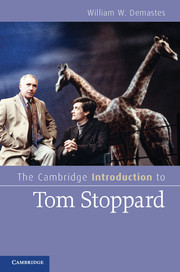Book contents
- Frontmatter
- Contents
- Illustrations
- Acknowledgements
- Introduction: Stoppardianism
- Professional chronology
- Chapter 1 Stoppard: briefly, a life in the theatre
- Chapter 2 Keys to Stoppard’s theatre
- Chapter 3 The breakthrough years
- Chapter 4 Playing with the stage
- Chapter 5 Science takes the stage
- Chapter 6 Love is in the air
- Chapter 7 Politics humanized
- Conclusion: The play’s the thing
- Appendix Stoppard’s theatre: a summary
- Notes
- Guide to further reading
- Index
Chapter 3 - The breakthrough years
Published online by Cambridge University Press: 05 December 2012
- Frontmatter
- Contents
- Illustrations
- Acknowledgements
- Introduction: Stoppardianism
- Professional chronology
- Chapter 1 Stoppard: briefly, a life in the theatre
- Chapter 2 Keys to Stoppard’s theatre
- Chapter 3 The breakthrough years
- Chapter 4 Playing with the stage
- Chapter 5 Science takes the stage
- Chapter 6 Love is in the air
- Chapter 7 Politics humanized
- Conclusion: The play’s the thing
- Appendix Stoppard’s theatre: a summary
- Notes
- Guide to further reading
- Index
Summary
We drift down time, clutching at straws. But what good’s a brick to a drowning man?
Rosencrantz and Guildenstern Are Dead (108)What some critics describe as Stoppard’s “overnight success” with Rosencrantz and Guildenstern Are Dead was actually anything but overnight given that Stoppard had been a professional writer for nearly a decade. Overnight or not, Stoppard certainly welcomed the recognition. His other major accomplishment during the period, the novel Lord Malquist and Mr. Moon, was not such a critical or popular sensation. It is, however, a work that stands the test of time and still awaits the full attention it deserves.
Two early works
There’s two of everyone . . . I mean if he’s the same in the pub as he is with us, then he’s had it.
Enter a Free Man (10)Stoppard’s career prior to his breakthrough Rosencrantz and Guildenstern Are Dead is primarily that of an apprentice learning his craft by imitation. A Walk on the Water (written 1960, rewritten and produced for television 1963), later retitled Enter a Free Man (1968), is his first full-length play. In interviews Stoppard playfully retitles it Flowering Death of a Salesman, combining Robert Bolt’s Flowering Cherry (1957) and Arthur Miller’s Death of a Salesman (1949), which – like Stoppard’s play – are about aging men who lose touch with reality. Stoppard acknowledges that first plays such as his “tend to be the sum of all the plays you have seen of a type you can emulate technically and have admired.” To that end he calls his other significant work from this early period, The Gamblers (written 1961–62, produced 1965), “Waiting for Godot in the Condemned Cell.”
- Type
- Chapter
- Information
- The Cambridge Introduction to Tom Stoppard , pp. 45 - 59Publisher: Cambridge University PressPrint publication year: 2012

